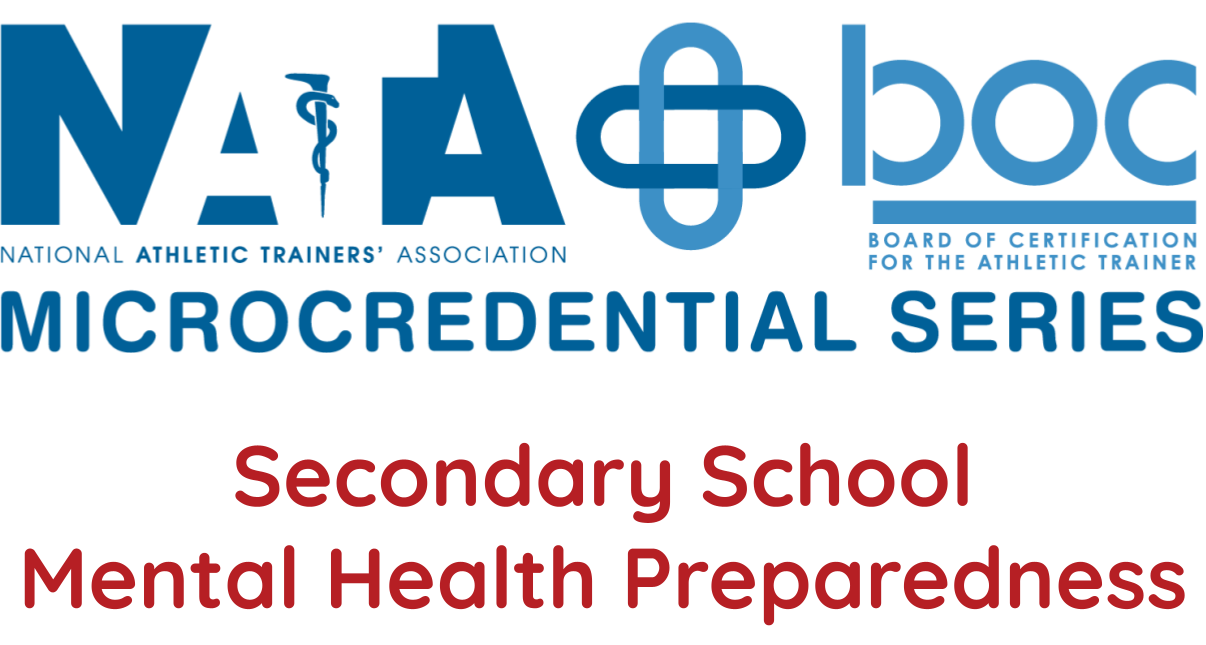
A Module for Developing Psychosocial Crisis Intervention Skills in Athletic Training Students
-
Register
- Non-member - $18.75
- Member - Free!
- Student - Free!
- Staff - Free!
- Certified Student - Free!
- Retired - $11.25
This presentation is a replay from 2019 NATA Athletic Training Educators' Conference, offering a second chance to experience the event's valuable content and insights.
Abstract:
The area of psychosocial intervention and referral in athletic training is especially problematic for both athletic training educators and their students. Recent consensus statements have detailed the importance of emergent mental health referrals in both high school and collegiate settings. However, research suggests that athletic trainers are comfortable knowing when to refer but are not comfortable with the actual act of approaching an athlete for referral. Teaching these skills with appropriate practical follow-up is difficult because there are, understandably, limited practice opportunities for student skill development in the clinical setting. In order to be effective, educational strategies must extend beyond lectures and focus on the psychomotor skills and abilities to help foster positive communication which leads to adequate referral. Further, the education must go beyond the signs and symptoms of specific mental health issues and focus on appropriate intervention for a person in crisis (regardless of underlying condition). The purpose of this presentation is to present a course module, developed jointly by a licensed professional counselor and an athletic trainer, with these skills and abilities in mind. The presentation will present the components of the entire module including course content materials, activities used to teach the appropriate skills and all grading documents that have been developed an actual recorded video of student interactions in a role-play situation along with rubrics developed for grading intervention behaviors will be shared.
Objectives:
- Participants will be able to identify the anatomy of a referral session for an athlete in crisis.,
- Participants will be able to identify appropriate communication strategies to use during a crisis intervention.,
- Participants will be able to identify important body language necessary to foster an appropriate rapport with the athlete.,
- Participants will be able to evaluate a video of a mocked referral session using assessment rubrics to provide feedback.,
- Participants will be able to identify common errors that students make when attempting these skills.
Level:
Essential
Domains:
Domain 2: Assessment Evaluation and Diagnosis
CEUs: 0.75 Category A
Keywords: mental health, students, crisis, intervention, psychosocial
Enhanced Access On-Demand Course Expiration:
Access to this course will expire at the end of the membership year on December 31 at 11:59 p.m. CST.
For full details, refer to the Expiration Date Policy on our FAQ page.
Angela Mickle, PhD, ATC
Angela Mickle has served as a member of the athletic training faculty at Radford University since 2001. She is teaches a wide variety of courses in the Athletic Training program and has developed an interprofessional curriculum in psychosocial interventions. Her primary areas of interest are acute and chronic pain management, organization and administration and team based learning.
Nadine Hartig, PhD, LCSW, LPC
Nadine Hartig is a Licensed Professional Counselor (VA) and a Licensed Clinical Social Worker (CO). She holds a master’s degree in social work from the University of Wisconsin-Madison (1996) and a doctorate in Counselor Education and Supervision from the University of Northern Colorado (2004). She is a registered play therapist (RPT), Board Certified Tele-mental Health practitioner, and EMDRIA trained in EMDR.
She has over twenty-five years of clinical experience in a variety of settings, including universities, community mental health centers, K-12 schools, crisis settings, private practice, the State Public Defender’s Office, domestic violence and trauma centers, integrated behavioral health, and dual diagnosis treatment. She has been part of Radford University’s faculty since 2006, where she holds rank as Professor and serves as the chairperson of the Department of Counselor Education. She also serves as the Director for the Center of Integrated Health and Wellness.
She has taught across the counseling core, school counseling, couples and family counseling, and clinical mental health curricula for over fifteen years. Her areas of interest include trauma treatments, counseling children and adolescents, integrated health, wellness, supervision, leadership, sport performance, and career development.


